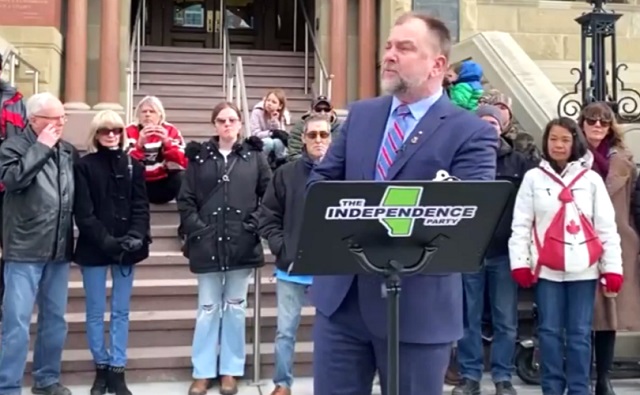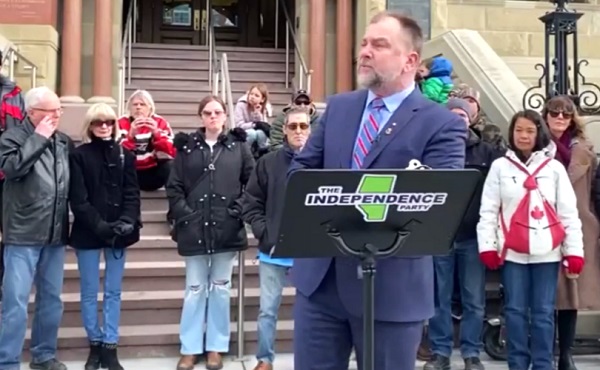Coutts Blockade
Pastor Artur Pawlowski appeals conviction for preaching at Freedom Convoy border protest in 2022

From LifeSiteNews
The Alberta pro-freedom pastor’s lawyers pointed out to the Calgary Court of Appeal that he did not ‘incite mischief’ but encouraged peaceful protesting.
Canadian Pastor Artur Pawlowski is appealing his conviction over a sermon he gave during a Freedom Convoy-related border protest blockade in February 2022 in Coutts, Alberta.
On September 10th, the Calgary Court of Appeal heard Pawlowski’s case after he was criminally charged for delivering a sermon at the Freedom Convoy-related border protest blockade.
“Pastor Artur did not actually incite mischief,” Pawlowski’s lawyer, Sarah Miller, told the court.
In May 2023, a court found Pawlowski guilty of mischief and breaching a release order for his sermon to the protesters.
Pawlowski is also facing a serious criminal charge of “willfully damaging and destroying essential infrastructure,” which will be ruled upon once a constitutional case brought by his lawyers is heard.
Pawlowski’s conviction stems largely from a sermon he gave in Coutts on February 3, 2022 to a group of truckers and protesters blocking entrance into the U.S. state of Montana.
At the time, he told the large crowd of protesters who had gathered in support of the trucker strike to peacefully “hold the line.”
While Pawlowski’s lawyers argued that his speech was made to encourage protesters to find a peaceful solution to the blockade, the statement is being characterized as a call for mischief.
Days later, on February 8, Pawlowski was arrested – for the fifth time – by an undercover SWAT team just before he was slated to speak again to the Coutts protesters.
He was subsequently jailed for nearly three months, which he has said was for speaking out against COVID mandates, the subject of all the Freedom Convoy-related protests.
During the appeal, Miller admitted that there was mischief at the protest but pointed out that Pawlowski was not part of it.
“We’re not saying that there was no mischief afoot. We’re saying it’s not on Pastor Artur,” she said.
Indeed, Pawlowski recently posted his speech on X, formerly known as Twitter, as evidence that he did not incite violence or mischief of any kind.
“Here is again my entire sermon to the truckers delivered by me on private property in a supposedly free and democratic society!” he wrote.
“For those words, the conservative Canadian government locked me up in prison!” he continued. “Please support my fight against this totalitarian regime! I have launched a lawsuit against them, and you can become part of this fight for freedom!!!
“Be blessed and stay strong in the Mighty Name of Jesus Christ!” Pawlowski declared.
Here is again my entire sermon to the truckers delivered by me on private property in a supposedly free and democratic society!
For those words, the conservative Canadian government locked me up in prison!
Please support my fight against this totalitarian regime! I have… pic.twitter.com/tbZRc80yTZ
— Artur Pawlowski (@ArturPawlowski1) September 10, 2024
Pawlowski is the first Albertan to be charged for violating the province’s Critical Infrastructure Defence Act (CIDA), which was put in place in 2020 under then-premier Jason Kenney.
The CIDA, however, was not put in place due to COVID mandates but rather after anti-pipeline protesters blockaded key infrastructure points such as railway lines in Alberta a few years ago.
Alberta
Alberta court upholds conviction of Pastor Artur Pawlowski for preaching at Freedom Convoy protest

From LifeSiteNews
Lawyers argued that Pastor Artur Pawlowski’s sermon was intended to encourage protesters to find a peaceful solution to the blockade, but the statement was characterized as a call for mischief.
An Alberta Court of Appeal ruled that Calgary Pastor Artur Pawlowski is guilty of mischief for his sermon at the Freedom Convoy-related border protest blockade in February 2022 in Coutts, Alberta.
On October 29, Alberta Court of Appeal Justice Gordon Krinke sentenced the pro-freedom pastor to 60 days in jail for “counselling mischief” by encouraging protesters to continue blocking Highway 4 to protest COVID mandates.
“A reasonable person would understand the appellant’s speech to be an active inducement of the illegal activity that was ongoing and that the appellant intended for his speech to be so understood,” the decision reads.
Pawlowski addressed a group of truckers and protesters blocking entrance into the U.S. state of Montana on February 3, the fifth day of the Freedom Convoy-styled protest. He encouraged the protesters to “hold the line” after they had reportedly made a deal with Royal Canadian Mounted Police to leave the border crossing and travel to Edmonton.
“The eyes of the world are fixed right here on you guys. You are the heroes,” Pawlowski said. “Don’t you dare go breaking the line.”
After Pawlowski’s sermon, the protesters remained at the border crossing for two additional weeks. While his lawyers argued that his speech was made to encourage protesters to find a peaceful solution to the blockade, the statement is being characterized as a call for mischief.
Days later, on February 8, Pawlowski was arrested – for the fifth time – by an undercover SWAT team just before he was slated to speak again to the Coutts protesters.
He was subsequently jailed for nearly three months for what he said was for speaking out against COVID mandates, the subject of all the Freedom Convoy-related protests.
In Krinke’s decision, he argued that Pawlowski’s sermon incited the continuation of the protest, saying, “The Charter does not provide justification to anybody who incites a third party to commit such crimes.”
However, defence lawyer Sarah Miller pointed out that that Pawlowski’s sermon was protected under freedom of speech, an argument that Krinke quickly dismissed.
“While the appellant is correct that peaceful, lawful and nonviolent communication is entitled to protection, blockading a highway is an inherently aggressive and potentially violent form of conduct, designed to intimidate and impede the movement of third parties,” he wrote.
Pawlowski was released after the verdict. He has already spent 78 days in jail before the trial.
Pawlowski is the first Albertan to be charged for violating the province’s Critical Infrastructure Defence Act (CIDA), which was put in place in 2020 under then-Premier Jason Kenney.
The CIDA, however, was not put in place due to COVID mandates but rather after anti-pipeline protesters blockaded key infrastructure points such as railway lines in Alberta a few years ago.
Alberta
Charges dropped against 50 Freedom Convoy-inspired truckers from Coutts protest

From LifeSiteNews
The Government attempted to bring charges against individuals and companies who allegedly had equipment parked on and near the highway during the Coutts Freedom Convoy protest.
Some 50 truckers who protested COVID mandates by participating in the 2022 Freedom Convoy-inspired blockade protests at the Canadian-U.S. border with have seen their tickets dropped, the freedom-orientated legal group representing them has said.
In a press release, The Democracy Fund (TDF) announced that in partnership with Williamson Law (WL) it was able to successfully “defend against tickets” issued under Canada’s Use of Highway and Rules of the Road Regulation and other regulatory statutes, for some 50 or so truckers who protested at the Coutts, Alberta border with the U.S. State of Montana in 2022.
“WL lawyers requested disclosure and held multiple discussions with the Crown, resulting in the withdrawal of tickets for all but 11 cases,” noted TDF.
As for the remaining 11 cases, the Crown was “determined to proceed” with them, so TDF with WL’s help “sought subpoenas for the Alberta Premier’s Office, Alberta Sheriffs, Edmonton Police Service, Criminal Intelligence Service Alberta (CISA), and Provincial Security and Intelligence Office (PSIO) to give evidence in respect of disclosure issues.”
TDF observed that because of seeking the subpoenas, along with additional “discussions” with the defense counsel, it was able to “resolve” the 11 remaining tickets for only “$1 each.”
“As a result, no client was convicted at trial and all matters were successfully resolved,” noted TDF.
Lawyer Chad Williamson of WL reacted to the results saying it “represents an outstanding victory for civil liberty clients of The Democracy Fund.”
“The Government attempted to bring charges against individuals and companies who allegedly had equipment parked on and near the highway during the Coutts Freedom Convoy protest. In the face of a robust and steadfast defence, we were successful in having close to 50 charges withdrawn immediately,” he said.
Williamson added that when the Crown sought to “prosecute the remaining 11 truckers, we sought subpoenas for parties we believed had relevant knowledge of the underlying events.”
“At that point, the Crown agreed that the remaining charges should be resolved for $1 each,” he noted.
“These cases show that a strong and vigorous defence is the best protection against charges levied by the Government against peaceful protestors.”
While many Canadians who fought COVID fines, charges, and rules were successful in getting them overturned, others have not been successful.
As reported by LifeSiteNews, a Trudeau-appointed judge recently sentenced two men involved in the same 2022 Freedom Convoy-inspired border blockade protest in Coutts, Alberta, to six years in prison.
Also, Canada’s Supreme Court recently decided it will not hear appeals to two high-profile cases brought forth by People’s Party of Canada (PPC) leader Maxime Bernier and former Premier of Newfoundland Brian Peckford. The pair had alleged their “Charter rights” were violated because of Prime Minister Justin Trudeau’s government’s COVID jab travel mandates, which banned the vaccine-free from flying.
COVID vaccine mandates, which also came from provincial governments with the support of the federal government, split Canadian society. The mRNA shots have been linked to a multitude of negative and often severe side effects in children.
-

 COVID-192 days ago
COVID-192 days agoOntario man launches new challenge against province’s latest attempt to ban free expression on roadside billboards
-

 Energy2 days ago
Energy2 days agoThis Canada Day, Celebrate Energy Renewal
-

 COVID-1916 hours ago
COVID-1916 hours agoNew Peer-Reviewed Study Affirms COVID Vaccines Reduce Fertility
-

 Business12 hours ago
Business12 hours agoOttawa Funded the China Ferry Deal—Then Pretended to Oppose It
-

 Alberta1 day ago
Alberta1 day agoAlberta Next Takes A Look At Alberta Provincial Police Force
-

 Alberta2 days ago
Alberta2 days agoCanadian Oil Sands Production Expected to Reach All-time Highs this Year Despite Lower Oil Prices
-

 MAiD14 hours ago
MAiD14 hours agoCanada’s euthanasia regime is not health care, but a death machine for the unwanted
-

 International2 days ago
International2 days agoPresident Xi Skips Key Summit, Adding Fuel to Ebbing Power Theories





